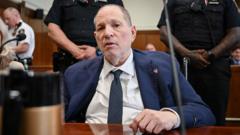The court's ruling has reignited debate around justice, accountability, and the legal system's handling of high-profile cases.
Illinois Supreme Court Overturns Smollett's Conviction Amid Controversy

Illinois Supreme Court Overturns Smollett's Conviction Amid Controversy
In a significant legal decision, the Illinois Supreme Court has annulled the conviction of actor Jussie Smollett, who was accused of orchestrating a hate crime against himself in 2019.
The Illinois Supreme Court has made waves by overturning the conviction of Jussie Smollett, known for his role in the television series "Empire." The actor had been found guilty in 2021 of five counts of disorderly conduct for allegedly staging a racist and homophobic attack against himself in Chicago in early 2019. Smollett, who is both Black and gay, asserted that two masked men assaulted him while yelling racial slurs and placing a noose around his neck during an evening stroll. He claimed this was a genuine hate crime, despite allegations that he paid the supposed attackers $3,500 to enact the attack.
Initially sentenced to 150 days in jail, Smollett spent only six days behind bars before being released pending his appeal process. His defense team successfully argued that the charges against him were improperly pursued by a special prosecutor after the Cook County State Attorney's Office had previously dismissed the case, allowing Smollett to fulfill community service agreements.
The court's decision has prompted backlash, particularly from public figures like Chicago Mayor Rahm Emanuel, who criticized the ruling as a failure to hold Smollett accountable. The Supreme Court acknowledged the high public interest in the case, noting that many felt unsatisfied with the initial resolution. However, the justices emphasized the importance of upholding legal agreements, stating that the state must honor commitments made during judicial processes.
Throughout his trial, prosecutors contended that Smollett had staged the attack due to dissatisfaction with the handling of hate mail he had received, while Smollett continued to assert that he had genuinely been targeted in a hate crime. The two brothers involved in the case, who testified against him, claimed to have received payment from Smollett to execute the purported assault.
This ruling leaves lingering questions about justice in high-profile cases and the balance between public sentiment and legal principles.
Initially sentenced to 150 days in jail, Smollett spent only six days behind bars before being released pending his appeal process. His defense team successfully argued that the charges against him were improperly pursued by a special prosecutor after the Cook County State Attorney's Office had previously dismissed the case, allowing Smollett to fulfill community service agreements.
The court's decision has prompted backlash, particularly from public figures like Chicago Mayor Rahm Emanuel, who criticized the ruling as a failure to hold Smollett accountable. The Supreme Court acknowledged the high public interest in the case, noting that many felt unsatisfied with the initial resolution. However, the justices emphasized the importance of upholding legal agreements, stating that the state must honor commitments made during judicial processes.
Throughout his trial, prosecutors contended that Smollett had staged the attack due to dissatisfaction with the handling of hate mail he had received, while Smollett continued to assert that he had genuinely been targeted in a hate crime. The two brothers involved in the case, who testified against him, claimed to have received payment from Smollett to execute the purported assault.
This ruling leaves lingering questions about justice in high-profile cases and the balance between public sentiment and legal principles.



















